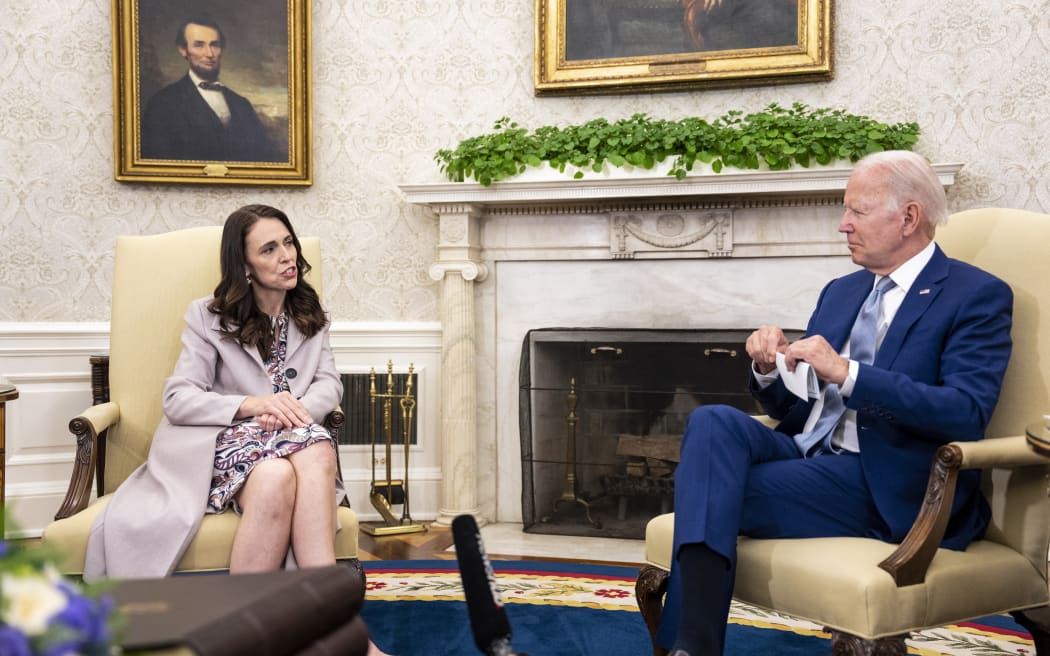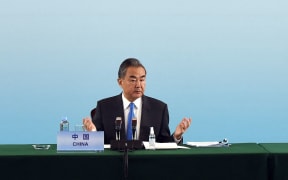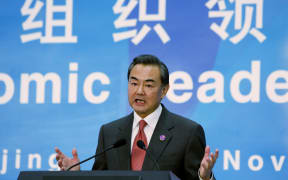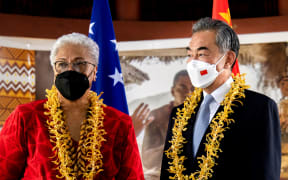New Zealand seems to be on track to becoming full military allies with the United States, a defence analyst says, following the prime minister's White House visit.

The United States and New Zealand released a joint statement on Wednesday after US President Joe Biden and Prime Minister Jacinda Ardern met in the Oval Office yesterday. Photo:
The two countries issued a joint statement after the Oval Office meeting early Wednesday morning (NZT), including an undertaking for more defence cooperation.
The move has also prompted alarm from the Green Party, which is demanding the government explain exactly what it has signed up to.
Defence analyst Paul Buchanan told RNZ the commitment expanded on previous agreements but showed the government was edging closer to the US.
The increased cooperation could see the Defence Force running "more enhanced maritime operations" to assist Washington DC, he said.
"For the left side of the political spectrum, this announcement is a nightmare, because it appears to be putting us on a path to becoming full US military allies, and if nothing else, military vassals of a traditional imperialist power," Buchanan said.
The development is part of US efforts to counter China's aggressive campaign to extend its influence in the Indo-Pacific through an array of security deals.
The US-NZ statement includes a commitment to bolstering security: "We acknowledge that... defence will become an ever-more-important focus of our strategic partnership."
Both countries would explore ways to combine operations and expand co-operation "as New Zealand takes delivery of new capabilities", the document said.
The document lists personnel exchanges and co-deployments as potential ways to "increase the interoperability of our forces".
Buchanan - who runs the consultancy service 36th Parallel Assessments - said the joint statement was "a little too US-centric" for his liking and had too great a focus on security.
"New Zealand has to tread very carefully when it comes to the larger geopolitical game being played," he said.
"The United States is convincing New Zealand that its security interests lie with the West... but New Zealand has to maintain on other fronts - diplomatic, economic and cultural - at least a modicum of independence, so as to not appear like another US lapdog in the South Pacific.
"I happen to think that we need to consult a little more with our Pacific Island neighbours and a little less with the people in Canberra and Washington DC."
Green Party Foreign Affairs spokesperson Golriz Ghahraman said she was surprised by the "unexpected degree of proximity" outlined in the joint statement.
"It's announcing at its core that New Zealand is going to partner with a world military force that doesn't always share our values."

Green Party Foreign Affairs spokesperson Golriz Ghahraman wants to know exactly what was agreed with the US. Photo: ©VNP / Phil Smith
Ghahraman said the government must explain to the public exactly what the commitment involved.
"Where are our bottom lines here? Because actually, it's not enough just to go blindly following the US into its approach when it comes to military or security issues."
Defence Minister Peeni Henare turned down RNZ's request for an interview.
Speaking immediately after the White House visit, Prime Minister Jacinda Ardern told reporters New Zealand maintained its independence in foreign policy.
"Our view is that our relationship cannot be determined by the actions of others, we have to be consistent, we have to be values based, and we have to engage on New Zealand's terms."
Ardern said the US agreed with NZ that the Pacific nations had to decide their own future.
"The focus in our region is on furthering the Pacific values and the focus that Pacific Island leaders have determined for themselves," Ardern said.
National MP Gerry Brownlee said increased military involvement with the US was sensible.
"There are various niche expertise that New Zealand has in its military, which can be complementary, and it's good if they have those opportunities."
Brownlee said the US and NZ shared many values - such as the benefits of democracy - but "in a changing world, you've got to work hard to keep those commonalities to the fore".






